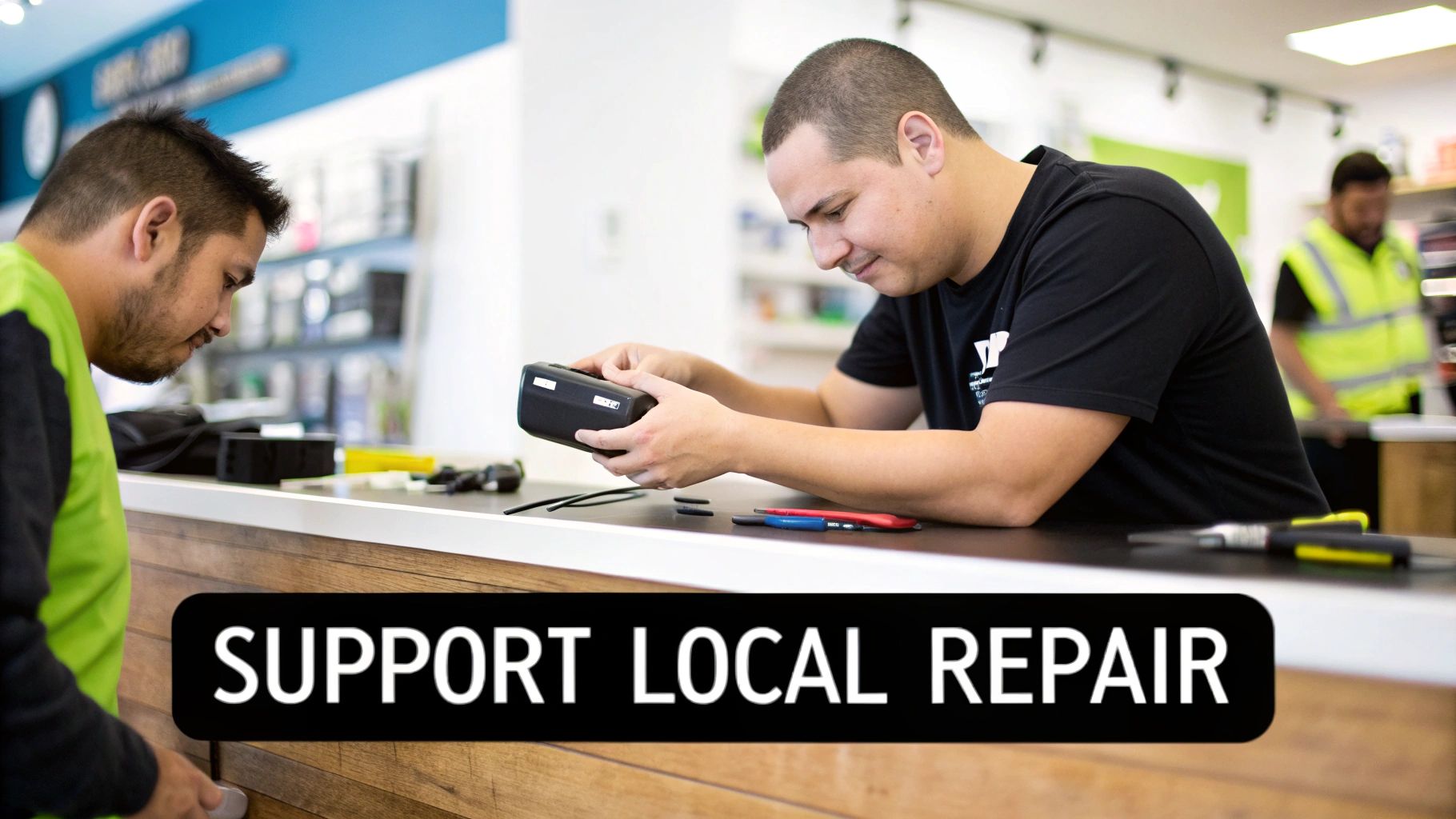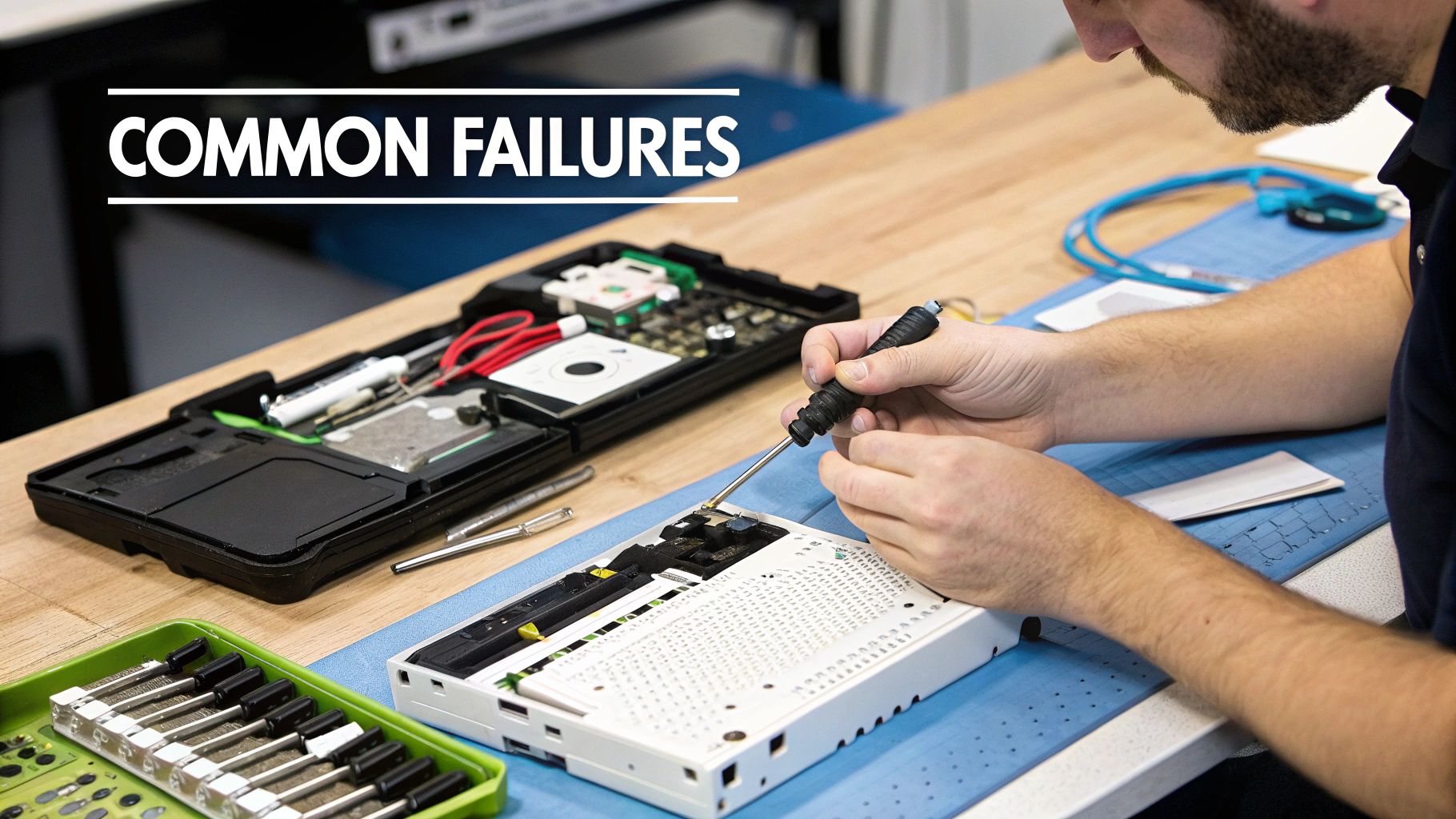When your console packs it in, you’re faced with a big decision: do you ship it off to the manufacturer, or do you find a local expert? For gamers here in Australia, searching for "gaming console repair near me" and finding a local pro is almost always the better bet. You get a faster, more affordable fix and you can actually talk to the person handling your pride and joy.
Why Local Repair Shops Are a Gamer's Best Friend

So, your PlayStation 5 has hit you with the dreaded "Blue Light of Death," or maybe your Nintendo Switch has decided it no longer wants to charge. Your first thought might be to go straight to the source and contact the manufacturer. But hold on a second. That route often means long waits, high fixed-rate costs, and dealing with a faceless support system. A local repair shop offers a much more compelling alternative that gets you back in the game quicker.
Get It Fixed Faster and Cheaper
Let's be honest, the biggest advantage is the turnaround time. Sending your console to a national service centre can leave you without your machine for weeks. A local technician, on the other hand, can often diagnose the problem and fix common issues—like a busted HDMI port or a faulty disc drive—in just a few days. Sometimes, you might even get it back the same day.
On top of that, local shops are usually much friendlier on the wallet. They source their own parts and charge you for the specific repair, not a flat fee designed to cover the worst-case scenario. This straightforward approach can save you a fair bit of cash.
Personalised Service You Can Actually Trust
Ever tried to explain a weird, intermittent glitch to a support agent reading from a script? It's frustrating. With a local shop, you're talking directly to the person who will be opening up your console. That face-to-face chat ensures they get exactly what's wrong, and you get clear answers about what the fix involves.
Being able to have a proper conversation with the technician is invaluable. You're not just another ticket number; you're a fellow gamer whose passion they understand and respect.
This direct relationship builds a level of trust and accountability you just don't get from a massive corporation. It’s also worth noting that the right-to-repair movement is gaining momentum, which only strengthens the case for local experts. The electronic equipment repair industry in Australia is a big deal, with a market size estimated at AUD 3.1 billion in 2024. By choosing a local shop, you're not just fixing your console—you're supporting a skilled professional right in your own community. You can discover more about this growing industry on IBISWorld.com.
How to Find and Vet the Right Repair Service

Let's be honest, not all repair shops are created equal. Punching "gaming console repair near me" into Google is easy, but that’s just the first step. The real work is figuring out which of those local options you can actually trust with your expensive gear.
Your first port of call should be genuine customer reviews on independent sites like Google or Yelp. Sift through the feedback and look for patterns. Are multiple people raving about their quick turnaround on PS5 HDMI port fixes? That's a great sign. On the flip side, if you see repeated complaints about poor communication or repairs that died a week later, you know to steer clear.
Asking the Right Questions Before You Commit
Once you have a shortlist of a few local shops, it’s time to pick up the phone. You can learn a lot about a business's expertise and professionalism from a quick five-minute chat. Don't just show up blind; go in prepared with a few pointed questions.
Here’s what I always recommend asking to gauge their experience and transparency:
- "What's your diagnostic process, and is there a fee?" A professional shop will almost always offer a free or low-cost diagnostic service. They should pinpoint the exact problem before asking you to open your wallet for the full repair cost.
- "Have you worked on this specific problem before?" If your Xbox is suffering from the dreaded "Green Screen of Death," you want a technician who has successfully revived dozens of them, not someone who mostly fixes phone screens.
- "What sort of warranty do you offer on your repairs?" This is non-negotiable. Look for at least a 90-day warranty covering both parts and labour. Anything less is a major red flag, as it suggests they don't stand behind the quality of their work.
This whole vetting process isn't just for consoles. It's the same logic you'd apply if you were looking for a tablet screen repair near me—quality and trust are everything.
Finding a technician who specialises in consoles is key. A general electronics repairer might be able to fix it, but a specialist lives and breathes these machines, understanding their common quirks and weaknesses inside and out.
Quick Checklist for Vetting a Repair Shop
To make things easier, here’s a quick-glance table to help you compare your options.
| Evaluation Criteria | What to Look For | Red Flags to Avoid |
|---|---|---|
| Online Reviews | Consistent positive feedback on Google, Yelp, etc. | A pattern of complaints about the same issues. |
| Specialisation | Explicitly mentions console repair as a core service. | Vague "electronics repair" with no specific examples. |
| Warranty Policy | A clear 90-day or longer warranty on parts and labour. | No warranty, or anything less than 90 days. |
| Diagnostic Fee | Free or low-cost diagnostic service upfront. | High, non-refundable diagnostic fees. |
| Communication | Clear, confident answers to your questions. | Vague responses or pressure to commit immediately. |
| Price Quote | A transparent, itemised quote before work begins. | Refusal to provide a quote until the work is done. |
This checklist should give you a solid framework for making a confident decision.
Ultimately, you need to trust your gut. If a technician seems evasive, rushes you off the phone, or pressures you into a repair without a clear diagnosis, just walk away. The right expert will be happy to answer your questions and give you the peace of mind you need.
What's Actually Wrong With Your Console? Common Failures and Repair Insights

When you're searching online for "gaming console repair near me," it really helps to have a rough idea of what's gone wrong. Knowing the most common problems takes the mystery out of the situation and helps you have a much better conversation with the repair technician.
Gaming consoles are complex pieces of kit, and just like anything else with a circuit board, they have their usual weak spots. From the PlayStation's dreaded "Blue Light of Death" to an Xbox that stubbornly refuses to read your discs, these issues usually point to specific internal parts that have given up the ghost.
The Usual Hardware Suspects
The good news is that many of the problems that look like a total disaster are actually well-known hardware faults. A good technician has probably seen your exact problem hundreds of times and knows exactly what to do.
Here are a few of the most frequent failures that walk through their doors:
- Busted HDMI Port: This is hands-down one of the most common repairs. All that plugging and unplugging of cables can physically damage the delicate pins inside the port, resulting in a black screen or glitchy graphics.
- Overheating: Dust is the number one villain here. It clogs up cooling vents and chokes the internal fan, forcing your console to throttle its performance or shut down completely to avoid frying itself.
- Disc Drive Dramas: Sometimes the mechanical rollers wear out, other times the laser dies. Whatever the cause, a faulty disc drive will stop accepting, reading, or ejecting your games.
- Power Supply Failure: If your console is completely dead—no lights, no sounds, nothing—the internal power supply unit has likely failed. For an experienced tech, this is a pretty straightforward replacement.
Understanding what's likely wrong with your console changes the entire repair experience. You go from dropping off a broken box to being an informed customer who can understand the quote and appreciate the skill involved in the fix.
It's also worth remembering that software glitches can sometimes look a lot like hardware failures, which is why a proper diagnosis from a professional is so important. In some rare cases, a strange glitch might even make you think you have a virus. While consoles are quite secure, it's always smart to maintain good digital safety habits. Many of the same principles for PC security apply, which you can learn about in our guide on how to remove a virus from a computer.
Getting Your Console Ready for Drop-Off

So, you’ve picked out a promising repair shop. Nice one. Before you rush out the door, a little bit of prep work will make a massive difference. Taking a few minutes to get your console ready helps the technician jump right into the diagnosis and keeps your personal info safe and sound.
First things first: back up your saved data. Seriously, don't skip this. Whether you use the cloud (like PlayStation Plus or Xbox Cloud Gaming) or an external hard drive, make sure those hundreds of hours of game progress are safe. Sometimes a factory reset is the only way forward for a technician, and without a backup, all that progress is gone for good.
Next, pop out any physical media. Eject that Blu-ray from your PlayStation or Xbox, and take the game card out of your Nintendo Switch. It's a simple thing to forget in the heat of the moment, but it saves your favourite game from getting lost in the shuffle at the workshop.
Protect Your Privacy and Help the Technician
This is a big one: log out of your primary accounts. While any reputable technician is a professional, it’s just smart practice to protect your profile, payment details, and personal data. Think of it as a basic digital security step for your own peace of mind.
The goal is to hand over only what's necessary for the fix. A well-prepared console lets the technician focus purely on the hardware problem without having to navigate your personal settings or worry about your data.
Finally, have a quick think about what accessories you need to bring along. If you’re dealing with controller drift, bring that specific controller. If the console won't turn on, definitely bring the power cord you normally use. This helps the tech replicate the problem with your exact setup, which can speed things up immensely.
What to Bring with You:
- The console itself, obviously.
- The specific accessory that's playing up (e.g., a faulty controller or power brick).
- The power cord, especially if you're having any power-related issues.
Leave everything else, like your other controllers and HDMI cables, safely at home. No need to bring the whole kit.
Unpacking Repair Costs and Timelines
Nobody likes getting hit with an unexpected bill, especially when all you want is to get back to your game. Figuring out how a local shop comes up with its prices is the key to a good experience and helps you see the real value in what you're paying for.
A proper, transparent quote for any console repair should really only have two parts: parts and labour. The "parts" are the physical bits and pieces needed for the job—a new HDMI port, for instance, or a replacement cooling fan. "Labour" is what you're paying for the technician's time and, more importantly, their skill. This is where their experience really makes a difference.
With Australia’s gaming console market sitting at a massive AUD 1.3 billion in 2024, the need for good local technicians has never been higher. The great thing for us gamers is that this healthy market means more competition, which helps keep repair prices fair. If you're curious, you can find more stats on the Aussie gaming market at IMARC Group.
What’s a Realistic Turnaround Time?
One of the best reasons to look up "gaming console repair near me" and go local is speed. Obviously, every repair is unique, but you can get a pretty good idea of the timeline based on how tricky the job is.
Here’s a rough guide to what you can expect:
- Same-Day to 48 Hours: This is the typical window for more common fixes. Think disc drive replacements, a deep internal clean to stop overheating, or swapping out a dead power supply. Any decent shop will have these parts on hand.
- 3-5 Business Days: For the more serious stuff, like delicate motherboard work (we're talking micro-soldering) or rescuing a console from liquid damage, technicians need more time. This timeframe also applies if they have to order a specific part that isn't in stock.
A good repair shop will never start work without giving you a clear, itemised quote first. It should break down the cost of parts and labour so you know exactly what you’re paying for, with no nasty surprises.
And one last thing: always ask about the warranty. A reputable shop will back up its work, usually offering at least 90 days of coverage on both the new parts and their labour. It’s your peace of mind that the fix is done right and built to last.
Got Questions About Console Repairs? We’ve Got Answers
So, you’ve found a promising local technician, but you’ve still got some lingering questions. That's completely normal. Handing over your beloved and expensive console can feel a bit daunting, so let's tackle some of the most common worries gamers have when they need a repair.
One of the biggest concerns is always data privacy. What happens to your saved games, your account details, and all that personal info? A professional repair shop operates under strict privacy policies. Their technicians are there to fix the hardware problem, not snoop through your data. Still, like we mentioned earlier, it’s always a smart move to back up your data and sign out of your accounts before you drop it off. It just gives you that extra peace of mind.
But What If My Console Is Beyond Repair?
This is the question nobody wants to ask, but it's a valid one. Sometimes, the damage is just too severe. We’re talking about major liquid damage that has corroded the motherboard or a massive power surge that’s fried multiple key components. In these rare situations, a good technician will be straight with you.
A trustworthy repair expert won’t string you along. If the cost to fix your console is more than its current value, they’ll tell you that buying a new one makes more sense.
They won't try to sell you an expensive, pointless repair. Their job is to find the best solution for you, and sometimes, that means advising against a repair. With the number of gaming hardware users in Australia expected to hit 2.11 million by 2030, the need for honest advice is only going to increase. You can explore more about Australia's gaming hardware market on Statista.com. At the end of the day, that honest assessment from a pro is what really counts.
When your console gives up, don't give up on it. For expert diagnostics and reliable repairs in the Perth area, trust the team at CTF Mobile Phones & Computer Repairs. Get your free quote and get back in the game today.

